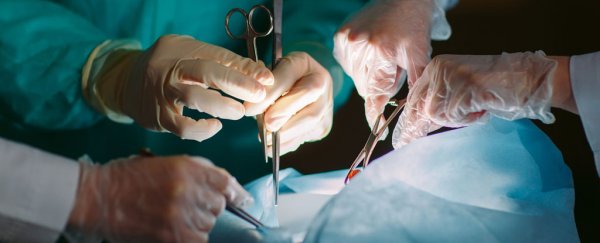An inquiry investigating research links to disgraced surgeon Paolo Macchiarini has revealed a supply chain of experimental implants used on patients that were never approved for human use.
The former celebrity scientist Macchiarini shot to fame on the promise of artificial windpipes, but was later accused of being an "extreme form" of con man, whose patients were duped into receiving dangerous and unproven treatments, with several later dying.
Now, an independent inquiry by University College London (UCL) in the UK has found that synthetic organs developed in the lab of one of its former researchers, Alexander Seifalian, ended up being implanted in human patients in operations around the world, despite never being approved as clinical grade.
"It's very serious and it's quite frightening to think that someone could be manufacturing this kind of device without knowing the regulations that govern it," transplantation surgeon Stephen Wigmore from the University of Edinburgh in the UK, who oversaw the inquiry, told The Guardian.
The unauthorised artificial organs developed in Seifalian's lab included an artificial windpipe implanted into a 36-year-old Eritrean man, in what was acclaimed at the time as the world's first synthetic trachea operation – before the implant failed, with the patient later dying.
Other implants that found their way into patients included a synthetic tear duct, an arterial graft, and plastic discs inserted behind the ear – none of which had ever been cleared for use in human operations.
"We deeply regret that materials (known as POSS-PCU constructs), that had not undergone rigorous pre-clinical assessment and which were not made to [good manufacturing practice] standards, were manufactured and supplied by Professor Alexander Seifalian's research laboratory for direct clinical use," the university said in a statement.
"Our governance systems should have prevented that. We also regret the wider, negative impact that this work had on the field of regenerative medicine research."
Seifalian, who was dismissed from UCL in 2016 due to an unrelated matter, has said he was unaware of the unauthorised operations until they had been conducted.
"The implantation was the job of the surgeon, who requires getting ethical approval and [regulatory] approval. This was not my job," he told Helen Thomson at New Scientist.
"We see, time and time again, research scientists being made scapegoats for systemic problems. I am extremely proud of the excellent, innovative work we did at UCL and we continue to build on this to address global health challenges in a responsible and ethical manner."
While it remains unclear whether UCL could be legally liable for any of the authorised implants, the inquiry is just the latest instalment chronicling the bizarre rise and fall of Macchiarini.
The surgeon became prominent in 2008 on the back of his supposed breakthroughs in regenerative medicine, before becoming embroiled in repeated scandals as seven of his eight patients who received synthetic trachea transplants died.
Away from science his private life also made headlines, with a much publicised feature in Vanity Fair characterising the researcher as an attention-seeking con man and scammer who claimed to his fiancé that the Pope would officiate at their upcoming wedding (he was, in fact, already married).
Amidst all the drama – and several retractions of his papers – Macchiarini lost his professional and academic postings at UCL, the Karolinska Institute in Sweden, and most recently, the Russian Science Foundation.
As for how the surgeon got away with so much, one former colleague, Karl-Henrik Grinnemo from the Karolinska Institute, said it was because Macchiarini always contrived a sense of emergency in his work.
"It was 'They're severely ill and they will die very soon and … we can't wait to get the permissions from the regulators'," Grinnemo told The Guardian last year.
"Everything was always in a hurry when it came to Paolo Macchiarini."
The inquiry's findings are reported here.
